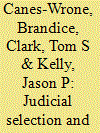| Srl | Item |
| 1 |
ID:
113544


|
|
|
|
|
| Publication |
2012.
|
| Summary/Abstract |
Studies of Organisation for Economic Co-operation and Development (OECD) countries have generally failed to detect real economic expansions in preelection periods, casting doubt on the existence of opportunistic political business cycles. We develop a theory that predicts that a substantial portion of the economy experiences a real decline in the preelection period if the election is associated with sufficient policy uncertainty. In particular, policy uncertainty induces private actors to postpone investments with high costs of reversal. The resulting declines, which are called reverse electoral business cycles, require sufficient levels of polarization between major parties and electoral competitiveness. To test these predictions, we examine quarterly data on private fixed investment in ten OECD countries between 1975 and 2006. The results show that reverse electoral business cycles exist and as expected, depend on electoral competitiveness and partisan polarization. Moreover, simply by removing private fixed investment from gross domestic product, we uncover evidence of opportunistic cycles.
|
|
|
|
|
|
|
|
|
|
|
|
|
|
|
|
| 2 |
ID:
131494


|
|
|
|
|
| Publication |
2014.
|
| Summary/Abstract |
Most U.S. state supreme court justices face elections or reappointment by elected officials, and research suggests that judicial campaigns have come to resemble those for other offices. We develop predictions on how selection systems should affect judicial decisions and test these predictions on an extensive dataset of death penalty decisions by state courts of last resort. Specifically, the data include over 12,000 decisions on over 2000 capital punishment cases decided between 1980 and 2006 in systems with partisan, nonpartisan, or retention elections or with reappointment. As predicted, the findings suggest that judges face the greatest pressure to uphold capital sentences in systems with nonpartisan ballots. Also as predicted, judges respond similarly to public opinion in systems with partisan elections or reappointment. Finally, the results indicate that the plebiscitary influences on judicial behavior emerge only after interest groups began achieving success at targeting justices for their decisions.
|
|
|
|
|
|
|
|
|
|
|
|
|
|
|
|